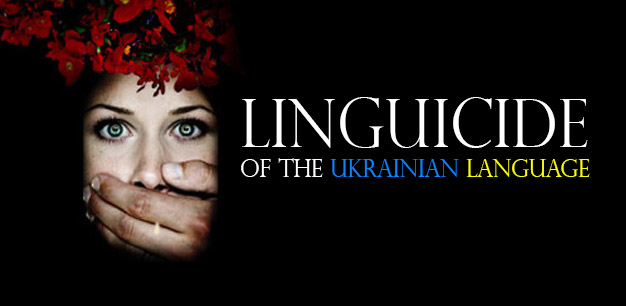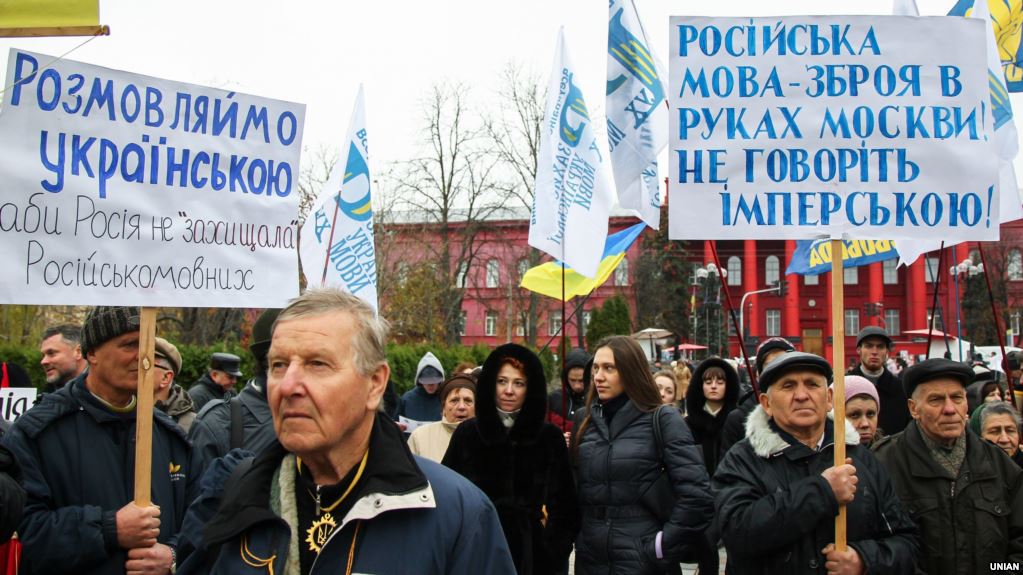 Oleksiy Stolyarenko, a lawyer, offers some insights into the Ukrainian language law and why it has been so misunderstood. Opinions aside, Stolyarenko lays out what is actually written in Ukrainian law.
Oleksiy Stolyarenko, a lawyer, offers some insights into the Ukrainian language law and why it has been so misunderstood. Opinions aside, Stolyarenko lays out what is actually written in Ukrainian law.
One of the first ‘scandals’ that beset Kyiv after the dust had settled from the departure of Viktor Yanukovych was with regard to what has widely been called a ‘ban on the Russian language.’ Opinions on this supposed ‘ban’ have been many and loud, but most of the people who have raised the language issue not only are not legal specialists, they have not even read the actual laws involved.
This incompetence has successfully misrepresented the matter at all levels, both domestically and internationally, typically in remarks such as Mikhail Khodorkovskiy’s address to students at the Kyiv Polytechnical Institute (KPI) on March 10, 2014, when he stated that the Ukrainian government had made a bad move with the “adoption by the Ukrainian legislature of a Bill revoking the status of the Russian language in Ukraine.”
Firstly, Ukraine never had a law “On the status of the Russian language in Ukraine.” Secondly, although the legal status of the Russian language in Ukraine has been slightly modified in recent years, in practice it has not changed.
So, setting aside the political component, let’s focus just on the legal aspects of the status of the Russian language in Ukraine.
The state language of Ukraine is Ukrainian
Today, language policy is governed in Ukraine by the 2012 Language Law (Law “On the principles of state language policy” dated July 3, 2012 N 5029-VI), drafted by Serhiy Kivalov and Vadym Kolesnychenko (Party of the Regions/PR). A February 23, 2014 vote to repeal this Law was vetoed by acting President Oleksandr Turchynov. This is what has been widely and incorrectly touted as a “ban” on the Russian language.
Art. 6 of the 2012 Language Law establishes Ukrainian as the state language, which must be used on the territory of Ukraine in all legislative, executive and judicial bodies. Para. 5 of Art. 6 specifically states: “Nothing in this Law shall be interpreted as limiting the use of the state language,” that is, Ukrainian.
A regional language can be established
Art. 7 of the Law stipulates that Ukraine also recognizes 18 minority languages as “regional” languages: Russian, Belarusian, Bulgarian, Armenian, Gagauzian, Yiddish, Crimean Tatar, Moldovan, German, Greek, Polish, Romani, Romanian, Slovak, Hungarian, Ruthenian, Karaite, and Krymchak.
Thus, the Russian language is granted no special status, but is a “regional” language, along with 17 others.
How is “regional status” determined for a language, whether Russian, Crimean Tatar, Moldovan or German? Two requirements are stipulated in the law:
1) at least 10% of the population must speak the language;
2) a petition must be presented to the oblast, county, city, town, village, or the Autonomous Republic of Crimea, followed by a decision by the relevant elected body.
“Upon the collection of signatures of more than 10% of those who live in a particular area, the local council is obliged to take the necessary decision [to recognize the regional language] within 30 days from the time that the signature lists were received.”
What regional status means in practice for governments
Once a language is recognized as a regional language, the Law provides for several options:
Art. 11 of the Law provides the option, but not the requirement, to use a regional language in the work of local governments, while the primary language for documentation remains the state language, Ukrainian:
“The primary language for work, records and documentation among state authorities and local governments shall be the state language. Within the territory on which a regional language(s) has fulfilled the conditions of the third paragraph of Art. 8 of the Law, the work, record- keeping and documentation of local authorities and local governments may make use of the regional language(s). The correspondence between these bodies and the state authorities of the highest level may use this regional language(s).”
Most of the controversy around this Law has focused on a provision of Part 3 of Art. 11 of the Law, which establishes that individuals may communicate and submit enquiries in any officially-recognized regional language(s) and obligates government officials to know and communicate with the public in such official regional language(s).
The Law provides for the use of any official regional language during elections, when platforms and promotional materials are presented in the Ukrainian language. According to Art. 12, however, translations into regional language(s) are optional for such election materials. Art. 13 also makes such translations optional for documents that identify individuals.
The use of language in legal proceedings, education and advertising
Art. 14 of the Law establishes the state language, Ukrainian, as the language of legal proceedings, but the courts, where possible, may, with the agreement of the parties involved, request the use an official regional language for both procedural documents and evidence, provided that it does not incur additional costs to the parties.
Section 5, Art. 14 also stipulates that “investigation and court documents shall be in the state language,” meaning Ukrainian. Art. 15 provides for the Ukrainian language to be used in pre-trial investigations and prosecutorial supervision, while Art. 16 requires it to be used in notarial paperwork.
The language of public education in Ukraine is Ukrainian, along with regional or minority languages, according to Art. 20, while universities can establish separate groups where possible to teach in any official regional language(s).
A provision in Art. 26 defines the language of advertising and labelling, stating that “labelling, manuals and the like shall be carried out in the state language and a regional language.”
The hidden costs of using “regional” languages in practice
Upon closer examination, the Kidalov-Kolesnichenko Law, as it came to be known, does not look like a milestone law that protects the Russian language or offers the Russian language special status. For one thing, Sec. 5 of the explanatory note to the Bill “On State Language Policy” argues: “The enactment of this bill will not require additional budget funds.” In fact, the practical implementation of government use of as many as 18 regional languages with a threshold of only 10% of the local population would be absurdly costly.
The Law was eventually adopted, but nothing actually changed on the ground, because its enactment was not properly planned, financed or implemented. The controversial Law proved to be a fiction to deceive Ukrainians in general and the speakers of regional languages in particular. In the end, status quo remained: predominantly Russian-speaking regions continued to operate mostly in Russian and the rest of the country in Ukrainian.
The flaws in the 2012 Language Law are many: no detailed procedure for recognizing a regional language were ever provided, leaving local councils to apply it as best they could, in a variety ways that did not add legitimacy to these decisions. In practice, this means that a minority language could become regional literally overnight and all organizations, individuals and businesses would suddenly have to start using that language—naturally at their own expense.
Today, there is no information as to where and what languages in Ukraine have been granted “regional” status, and to which council a citizen of Ukraine can actually write in Russian, Greek, Polish, Roma, German, and so on. Needless to say, there are practically no officials who are able to answer, advise or otherwise communicate in any of these languages.
For business, Art. 26, which says that product labels must be in Ukrainian and any official regional language, meaning that beer, horilka, chocolates and other companies that sells their products within a particular region, be that a village, a city, or an oblast, might suddenly have to add Slovak, Hungarian and Ruthenian to their labels. Not only are professional translators for many of the 18 minority languages very hard to find, but with consumer goods that go into every corner of the country, the prospect of translating labels for a company with a 3-5,000 product range is not only daunting financially, but also logistically nigh impossible—how to accommodate inscriptions in all 19 languages on a beer bottle or a pack of cigarettes?
Getting rid of a shoddy piece of legislation is not as easy as it sounds
These were all the considerations that the Verkhovna Rada had in mind during the early post-revolutionary days when it decided to repeal what was, in the words of separatist politician Mykhailo Dobkin, a not very well-written law. Except that this move was ill-timed and misinterpreted all around.
In short, the 2012 law was not about “giving Russian special status.” It wasn’t even specifically about the Russian language at all. But the uproar that the move to repeal it caused—all the result of both pundit incompetence and deliberate distortion even as the bill died in the legislature—gave Putin a weapon that he made full use of in Crimea and, later, in Eastern Ukraine.
Source: http://www.pravda.com.ua/rus/columns/2014/03/13/7018654/
Translated by Borys Vsylychyn, edited by Lidia Wolanskyj



